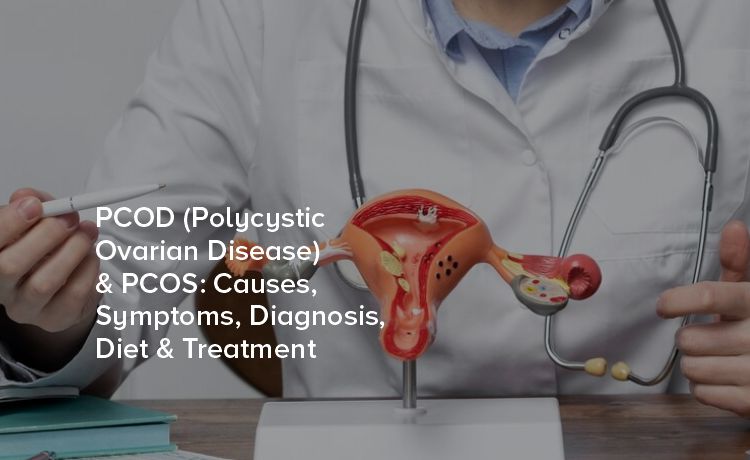
Polycystic ovarian disease (PCOD) and polycystic ovarian syndrome (PCOS) are complex endocrine disorders affecting millions of women worldwide. Despite their prevalence, PCOD and PCOS still remain widely misunderstood in various quarters. It's about time to demystify this condition and offer a comprehensive understanding of what they entail.
Understanding these conditions, including their intricacies, signs, and treatments, is crucial for women's health.
Before we can discuss how PCOD and PCOS affect individuals, it's important to understand what these acronyms stand for and how they differ:
PCOD (Polycystic Ovarian Disease) is a hormonal disorder that enlarges the ovary and leads to infrequent or prolonged menstrual periods. While most people understand PCOD as one of the leading causes of infertility, its effects aren't just limited to reproductive health – often leading to metabolic issues like diabetes and heart diseases.
PCOS (Polycystic Ovarian Syndrome) is a more widespread variation of PCOD, noted for its cystic appearance along the ovaries due to small follicles that fail to release eggs. The main features of PCOS include hormonal imbalances with high levels of male hormones (androgens), irregular or missed periods, and multiple cysts in the ovaries.
Although the conditions share similarities, the distinction between PCOD and PCOS is essential in diagnosis and treatment strategies.
The exact cause of PCOD and PCOS is not yet fully understood, but there are common factors that appear to play a significant role:
Hormonal Imbalance: Levels of male hormones (androgens) may be higher than normal in individuals with PCOS. High levels of insulin can also lead to an increase in androgens.
Insulin Resistance: The cells in the body use insulin less effectively due to increased insulin production, leading to higher levels of glucose in the blood.
Inflammation: Research suggests that women with PCOS have a type of low-grade inflammation, which can stimulate polycystic ovaries to produce androgens.
Genetics: Studies suggest that PCOS may have a genetic component. Research is ongoing to determine which genes are involved.
These underlying causes have a multifaceted impact on a woman's overall health, contributing to a range of symptoms, from mild to severe, and can present at any stage of life, from adolescence through menopause.
PCOD and PCOS can present with a variety of symptoms, but not all individuals exhibit the same signs. Some of the most common symptoms include:
Menstrual Irregularity: Including absent or irregular menstrual cycles, which can manifest as a lack of menstruation for several months.
Excess Androgens: High levels of male hormones can cause physical signs such as excess hair growth, male-pattern baldness, and severe acne.
Polycystic Ovaries: Enlarged ovaries with small cysts can be identified during an ultrasound.
Weight Gain or Obesity: Particularly around the waistline.
Insulin Resistance: Which can result in prediabetes or type 2 diabetes.
Infertility: PCOS is one of the leading causes of infertility due to lack of ovulation.
Diagnosis of these conditions often involves a combination of physical exams, pelvic ultrasounds, and blood tests to measure hormone levels and rule out other conditions that may cause similar symptoms. Understanding and recognizing these symptoms is key to seeking timely medical intervention.
For individuals with PCOD and PCOS, managing diet and lifestyle can greatly impact the condition. There isn't a one-size-fits-all approach, but several dietary and lifestyle considerations have shown benefits for many:
Balanced Diet: Eating a well-rounded diet that focuses on whole, unprocessed foods can help manage weight and improve insulin resistance. Millets to diet + more vegetables .
Exercise: Regular physical activity, at least 150 minutes a week, can improve insulin sensitivity.
Supplements: Some supplements like inositol and cinnamon can help manage insulin resistance. its substitute to diet exercise.
Weight Management: Achieving and maintaining a healthy weight can help regulate menstrual cycles and reduce the severity of symptoms.
Understanding the nutritional components that can potentially alleviate symptoms is a significant step toward managing these conditions.
Treatment for PCOD and PCOS depends on the goals of the individual, which can include managing symptoms, improving fertility, or preventing complications. Common treatment approaches include:
Lifestyle Changes: The first line of treatment, which includes diet and exercise, to manage weight and improve insulin resistance.
Medications: Various medications can be prescribed to regulate menstrual cycles and reduce the symptoms of high androgen levels, such as birth control pills, anti-androgen medications, and diabetes medications like metformin. it's a lifetime condition can be heprotec control.
Surgery: For some individuals, particularly those with PCOS, a procedure called ovarian drilling can help restore ovulation.
Living with PCOD and PCOS can be challenging, but it is possible to manage and lead a normal, fulfilling life. Seeking support from healthcare providers, joining support groups, and staying informed about recent research and advances in treatment can all contribute to a positive outlook and better management of the condition.
Regular Medical Follow-up: It's crucial to have regular check-ups with your healthcare provider to monitor and adjust treatments as needed.
Mental and Emotional Well-being: The emotional toll of PCOD and PCOS should not be underestimated. It's essential to address any mental health concerns and seek support when needed.
Family Planning: For those looking to start a family, early consultation with a fertility specialist can help outline options and next steps.
Awareness and education about PCOD and PCOS are powerful tools for the community, as they can help combat the stigma and misconceptions surrounding these conditions. Empowering individuals with knowledge enables them to advocate for themselves, improve their health outcomes, and contribute to a more supportive environment for those affected by PCOD and PCOS.
In conclusion, PCOD and PCOS present significant challenges, but with the right information, approach, and support, women can effectively manage these conditions. The future is promising, with ongoing research providing hope for more effective treatments and perhaps even a cure. For the best gynecology treatment in Hyderabad, Citizens Specialty Hospital is the top choice for expert care and personalized solutions.